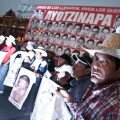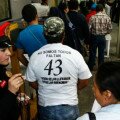diario19.com
La procuradora general de la República Arely Gómez, informó que especialistas de la Universidad de Innsbruck identificaron restos de otro estudiante de la normal rural de Ayotzinapa, desparecidos el 26 de septiembre del año pasado. Señalaron que se trata de Jhosivani Guerrero de la Cruz.
 La tarde noche del 16 de Septiembre de 2015, diez días antes de que se cumpla un año de los hechos en Iguala, Guerrero. La procuradora de la República informó en conferencia de Prensa, que los restos de Alexander Mora Venancio localizados anteriormente efectivamente corresponden al normalista, fortaleciendo la información de Murillo Karam en el sentido de que los cuerpos habían sido incinerados en el basurero de Cocula.
La tarde noche del 16 de Septiembre de 2015, diez días antes de que se cumpla un año de los hechos en Iguala, Guerrero. La procuradora de la República informó en conferencia de Prensa, que los restos de Alexander Mora Venancio localizados anteriormente efectivamente corresponden al normalista, fortaleciendo la información de Murillo Karam en el sentido de que los cuerpos habían sido incinerados en el basurero de Cocula.
En una lectura de informes a la prensa, provenientes de la Universidad de Austria, señaló que sin lugar a dudas y corroborado científicamente restos de los Normalistas corresponden a Jhosvani Guerrero y Alexander Mora.
Los indicios, dijo Arely Gómez, corroboran las investigaciones anteriores de la PGR, y serán entregados al juez de la causa, para que se anexen al expediente.
Las investigaciones sin embargo no terminan ahí. Dijo que el ejercicio continuará, con los expertos Argentinos y los miembros de la CIDH, y peritos de la PGR.
Successful DNA analyses on missing Mexican remains
Novel DNA technology applied at the Institute of Legal Medicine, Medical University of Innsbruck, Austria, yielded successful results in severely damaged Mexican remains.
Researchers at the Institute of Legal Medicine, Medical University of Innsbruck, adapted a novel technology known as Primer Extension Capture Massively Parallel Sequencing (PEC MPS) to successfully type highly damaged DNA. The method has been adapted to meet the stringent quality standards required in forensic genetics.
The scientists demonstrated that this method enables identification of biological material that is too damaged for conventional forensic DNA analysis.
The Institute of Legal Medicine received 17 severely burned samples from Mexico in November 2014. One sample was identified as belonging to one missing Mexican student using conventional DNA technology. This was reported in December 2014. The remaining 16 samples did not yield DNA results using conventional forensic DNA fingerprinting.
With PEC MPS the researchers were able to generate DNA profiles for nine of the 16 challenging samples. In two samples they foundhuman-specific mitochondrial DNA. One sample matched the relevant family references of the previously identified student, the other sample matched the relevant family references of another missing Mexican student. The two mitochondrial DNA profiles were unique in the set of family references of the missing students provided to the Institute. No other family reference sample matched either of the two.
The remaining seven samples brought results not related to human mitochondrial DNA. The biological source of these seven samples will be determined using metagenome analyses, which is currently under way.
Aquí puedes consultar el original: http://gerichtsmedizin.at/successful-dna-analyses-mexican-remains.html








